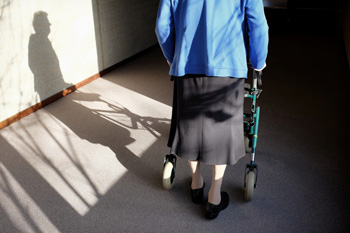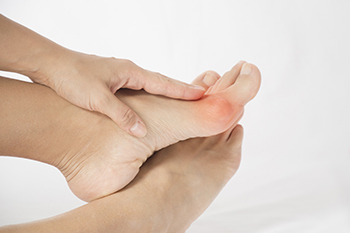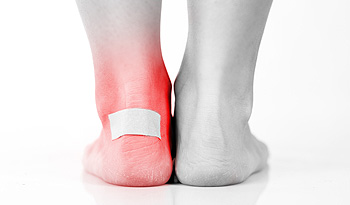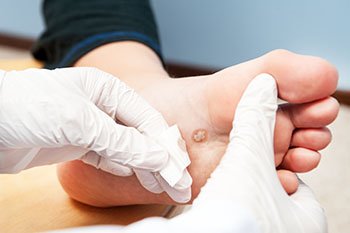Items filtered by date: August 2021
What Caused My Foot Blister?
A blister on your foot is usually the result of friction from your shoes or socks rubbing against a concentrated area of skin and causing the top layer of skin to separate from the layers beneath it. Although they can be painful, red, and swollen, friction blisters usually heal without medical intervention. But not all blisters are caused by friction. Severe burns and sunburns may produce blisters. Contact dermatitis, caused by a foreign substance irritating the skin, is another common cause of blisters. Certain skin conditions, such as chickenpox and eczema, may also result in foot blisters. If you have blisters on your feet and are unsure of the cause, or if your blisters are painful and not improving over time, please consult with a podiatrist.
Blisters may appear as a single bubble or in a cluster. They can cause a lot of pain and may be filled with pus, blood, or watery serum. If your feet are hurting, contact one of our podiatrists of Quad Cities Foot and Ankle Associates. Our doctors can provide the care you need to keep you pain-free and on your feet.
Foot Blisters
Foot blisters are often the result of friction. This happens due to the constant rubbing from shoes, which can lead to pain.
What Are Foot Blisters?
A foot blister is a small fluid-filled pocket that forms on the upper-most layer of the skin. Blisters are filled with clear fluid and can lead to blood drainage or pus if the area becomes infected.
Symptoms
(Blister symptoms may vary depending on what is causing them)
- Bubble of skin filled with fluid
- Redness
- Moderate to severe pain
- Itching
Prevention & Treatment
In order to prevent blisters, you should be sure to wear comfortable shoes with socks that cushion your feet and absorb sweat. Breaking a blister open may increase your chances of developing an infection. However, if your blister breaks, you should wash the area with soap and water immediately and then apply a bandage to the affected area. If your blisters cause severe pain it is important that you call your podiatrist right away.
If you have any questions, please feel free to contact our offices located in Bettendorf, and DeWitt, IA and Rock Island, IL . We offer the newest diagnostic and treatment technologies for all your foot care needs.
Footwear Do’s and Don’ts for Elderly Feet
 As we age, our feet experience the effects of age-related wear and tear. This can increase the risk of developing various foot and ankle problems, so it becomes increasingly important to take good care of the feet. One of the most important aspects of proper foot care is wearing the right shoes. Not only does wearing comfortable, well-fitting shoes make a foot or ankle injury less likely, it also reduces the risk of falling. Look for shoes that have a firm, non-slip sole and adequate cushioning. You should avoid walking barefoot, in slippers or flip-flops, or with only socks on. Wearing shoes with high heels taller than one inch is also not suggested, as excessively high heels can put too much pressure on the toes and balls of the feet. To learn more about elderly foot care, please speak with a podiatrist.
As we age, our feet experience the effects of age-related wear and tear. This can increase the risk of developing various foot and ankle problems, so it becomes increasingly important to take good care of the feet. One of the most important aspects of proper foot care is wearing the right shoes. Not only does wearing comfortable, well-fitting shoes make a foot or ankle injury less likely, it also reduces the risk of falling. Look for shoes that have a firm, non-slip sole and adequate cushioning. You should avoid walking barefoot, in slippers or flip-flops, or with only socks on. Wearing shoes with high heels taller than one inch is also not suggested, as excessively high heels can put too much pressure on the toes and balls of the feet. To learn more about elderly foot care, please speak with a podiatrist.
Proper foot care is something many older adults forget to consider. If you have any concerns about your feet and ankles, contact one of our podiatrists from Quad Cities Foot and Ankle Associates. Our doctors can provide the care you need to keep you pain-free and on your feet.
The Elderly and Their Feet
As we age we start to notice many changes in our body, but the elder population may not notice them right away. Medical conditions may prevent the elderly to take notice of their foot health right away. Poor vision is a lead contributor to not taking action for the elderly.
Common Conditions
- Neuropathy – can reduce feeling in the feet and can hide many life-threatening medical conditions.
- Reduced flexibility – prevents the ability of proper toenail trimming, and foot cleaning. If left untreated, it may lead to further medical issues.
- Foot sores – amongst the older population can be serious before they are discovered. Some of the problematic conditions they may face are:
- Gouging toenails affecting nearby toe
- Shoes that don’t fit properly
- Pressure sores
- Loss of circulation in legs & feet
- Edema & swelling of feet and ankles
Susceptible Infections
Diabetes and poor circulation can cause general loss of sensitivity over the years, turning a simple cut into a serious issue.
If you have any questions please feel free to contact our offices located in Bettendorf, and DeWitt, IA and Rock Island, IL . We offer the newest diagnostic and treatment technologies for all your foot and ankle needs.
Are You Experiencing Bunion Pain?
 A bunion is a bony bump that can form at the base of the big toe joint. Many people believe that bunions are a strictly cosmetic issue, only affecting the way that the foot looks, but bunions can also be painful and lead to other foot problems that may interfere with your day-to-day life. A bunion can push your big toe towards the smaller ones, changing the shape of the foot and making the big toe joint sore, stiff, swollen, or inflamed. Blisters, corns, and calluses may form in between or on top of the toes as your shoe rubs against the bunion. All of these symptoms can lead to difficulty walking and going about your daily activities. Furthermore, bunions can increase your risk of other potentially painful foot problems, including hammertoes, bursitis, and metatarsalgia. Bunions tend to worsen over time, so if you notice a bunion forming on your foot, it is suggested that you see a podiatrist for treatment as soon as possible.
A bunion is a bony bump that can form at the base of the big toe joint. Many people believe that bunions are a strictly cosmetic issue, only affecting the way that the foot looks, but bunions can also be painful and lead to other foot problems that may interfere with your day-to-day life. A bunion can push your big toe towards the smaller ones, changing the shape of the foot and making the big toe joint sore, stiff, swollen, or inflamed. Blisters, corns, and calluses may form in between or on top of the toes as your shoe rubs against the bunion. All of these symptoms can lead to difficulty walking and going about your daily activities. Furthermore, bunions can increase your risk of other potentially painful foot problems, including hammertoes, bursitis, and metatarsalgia. Bunions tend to worsen over time, so if you notice a bunion forming on your foot, it is suggested that you see a podiatrist for treatment as soon as possible.
If you are suffering from bunions, contact one of our podiatrists of Quad Cities Foot and Ankle Associates. Our doctors can provide the care you need to keep you pain-free and on your feet.
What Is a Bunion?
A bunion is formed of swollen tissue or an enlargement of boney growth, usually located at the base joint of the toe that connects to the foot. The swelling occurs due to the bones in the big toe shifting inward, which impacts the other toes of the foot. This causes the area around the base of the big toe to become inflamed and painful.
Why Do Bunions Form?
Genetics – Susceptibility to bunions are often hereditary
Stress on the feet – Poorly fitted and uncomfortable footwear that places stress on feet, such as heels, can worsen existing bunions
How Are Bunions Diagnosed?
Doctors often perform two tests – blood tests and x-rays – when trying to diagnose bunions, especially in the early stages of development. Blood tests help determine if the foot pain is being caused by something else, such as arthritis, while x-rays provide a clear picture of your bone structure to your doctor.
How Are Bunions Treated?
- Refrain from wearing heels or similar shoes that cause discomfort
- Select wider shoes that can provide more comfort and reduce pain
- Anti-inflammatory and pain management drugs
- Orthotics or foot inserts
- Surgery
If you have any questions, please feel free to contact our offices located in Bettendorf, and DeWitt, IA and Rock Island, IL . We offer the newest diagnostic and treatment technologies for all your foot care needs.
Diabetes and Podiatry
 If you have diabetes, it is suggested that you see a podiatrist regularly. This is because diabetics need to be extra vigilant about the health of their feet. Diabetes can cause poor circulation and diabetic neuropathy (a type of nerve damage that impairs sensation in the feet) to be more likely. These two complications can make it very difficult to detect other foot problems since they both interfere with the body’s ability to heal. When diabetes is left undetected and untreated, many common foot conditions can become particularly dangerous. Some of these conditions include sores or foot ulcers, corns, calluses, cracked heels, hammertoes, bunions, ingrown toenails, skin or bone infections, and abscesses. If you are afflicted with diabetes, it is highly suggested that you consult with a podiatrist who can help you manage and maintain proper foot health.
If you have diabetes, it is suggested that you see a podiatrist regularly. This is because diabetics need to be extra vigilant about the health of their feet. Diabetes can cause poor circulation and diabetic neuropathy (a type of nerve damage that impairs sensation in the feet) to be more likely. These two complications can make it very difficult to detect other foot problems since they both interfere with the body’s ability to heal. When diabetes is left undetected and untreated, many common foot conditions can become particularly dangerous. Some of these conditions include sores or foot ulcers, corns, calluses, cracked heels, hammertoes, bunions, ingrown toenails, skin or bone infections, and abscesses. If you are afflicted with diabetes, it is highly suggested that you consult with a podiatrist who can help you manage and maintain proper foot health.
Diabetic foot care is important in preventing foot ailments such as ulcers. If you are suffering from diabetes or have any other concerns about your feet, contact one of our podiatrists from Quad Cities Foot and Ankle Associates. Our doctors can provide the care you need to keep you pain-free and on your feet.
Diabetic Foot Care
Diabetes affects millions of people every year. The condition can damage blood vessels in many parts of the body, especially the feet. Because of this, taking care of your feet is essential if you have diabetes, and having a podiatrist help monitor your foot health is highly recommended.
The Importance of Caring for Your Feet
- Routinely inspect your feet for bruises or sores.
- Wear socks that fit your feet comfortably.
- Wear comfortable shoes that provide adequate support.
Patients with diabetes should have their doctor monitor their blood levels, as blood sugar levels play such a huge role in diabetic care. Monitoring these levels on a regular basis is highly advised.
It is always best to inform your healthcare professional of any concerns you may have regarding your feet, especially for diabetic patients. Early treatment and routine foot examinations are keys to maintaining proper health, especially because severe complications can arise if proper treatment is not applied.
If you have any questions please feel free to contact our offices located in Bettendorf, and DeWitt, IA and Rock Island, IL . We offer the newest diagnostic and treatment technologies for all your foot and ankle needs.
What Does a Foot Wart Look Like?
Plantar warts are fleshy growths that can appear on the soles of the feet. They are caused by a strain of the human papillomavirus (HPV). Unlike warts that affect other parts of the body, plantar warts are typically flat and cause a buildup of the top layer of skin. These warts may grow inward as the body’s weight puts pressure on the soles of the feet, causing pain. Plantar warts can appear as a single wart or a constellation of multiple warts. They have a rough, grainy texture and small block dots in the middle. Plantar warts are contagious and can spread between individuals. Fortunately, there are a variety of treatments available. If you find a wart on the bottom of your foot, a podiatrist can help find the right treatment for you.
Plantar warts can be very uncomfortable. If you need your feet checked, contact one of our podiatrists from Quad Cities Foot and Ankle Associates. Our doctors will assist you with all of your foot and ankle needs.
About Plantar Warts
Plantar warts are the result of HPV, or human papillomavirus, getting into open wounds on the feet. They are mostly found on the heels or balls of the feet.
While plantar warts are generally harmless, those experiencing excessive pain or those suffering from diabetes or a compromised immune system require immediate medical care. Plantar warts are easily diagnosed, usually through scraping off a bit of rough skin or by getting a biopsy.
Symptoms
- Lesions on the bottom of your feet, usually rough and grainy
- Hard or thick callused spots
- Wart seeds, which are small clotted blood vessels that look like little black spots
- Pain, discomfort, or tenderness of your feet when walking or standing
Treatment
- Freezing
- Electric tool removal
- Laser Treatment
- Topical Creams (prescription only)
- Over-the-counter medications
To help prevent developing plantar warts, avoid walking barefoot over abrasive surfaces that can cause cuts or wounds for HPV to get into. Avoiding direct contact with other warts, as well as not picking or rubbing existing warts, can help prevent the further spread of plantar warts. However, if you think you have developed plantar warts, speak to your podiatrist. He or she can diagnose the warts on your feet and recommend the appropriate treatment options.
If you have any questions please feel free to contact our offices located in Bettendorf, and DeWitt, IA and Rock Island, IL . We offer the newest diagnostic and treatment technologies for all your foot and ankle needs.


